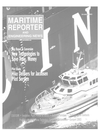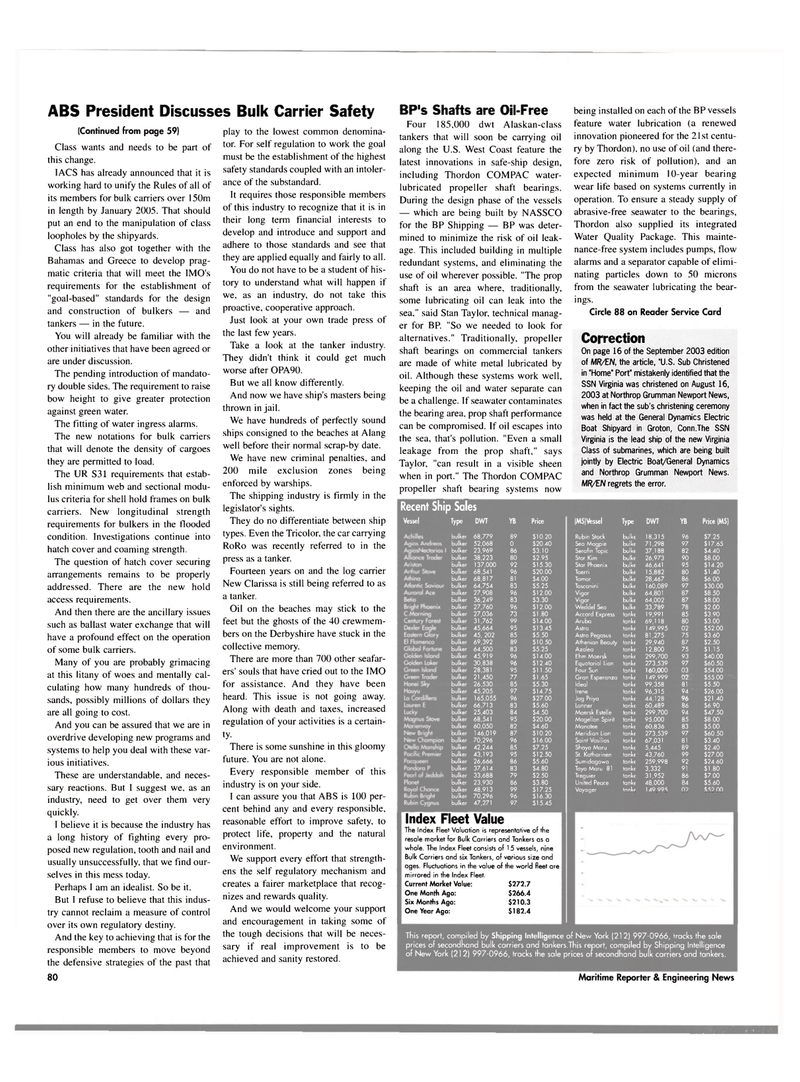
Page 82: of Maritime Reporter Magazine (October 2003)
Read this page in Pdf, Flash or Html5 edition of October 2003 Maritime Reporter Magazine
ABS President Discusses Bulk Carrier Safety (Continued from page 59)
Class wants and needs to be part of this change.
IACS has already announced that it is working hard to unify the Rules of all of its members for bulk carriers over 150m in length by January 2005. That should put an end to the manipulation of class loopholes by the shipyards.
Class has also got together with the
Bahamas and Greece to develop prag- matic criteria that will meet the IMO's requirements for the establishment of "goal-based" standards for the design and construction of bulkers — and tankers — in the future.
You will already be familiar with the other initiatives that have been agreed or are under discussion.
The pending introduction of mandato- ry double sides. The requirement to raise bow height to give greater protection against green water.
The fitting of water ingress alarms.
The new notations for bulk carriers that will denote the density of cargoes they are permitted to load.
The UR S31 requirements that estab- lish minimum web and sectional modu- lus criteria for shell hold frames on bulk carriers. New longitudinal strength requirements for bulkers in the flooded condition. Investigations continue into hatch cover and coaming strength.
The question of hatch cover securing arrangements remains to be properly addressed. There are the new hold access requirements.
And then there are the ancillary issues such as ballast water exchange that will have a profound effect on the operation of some bulk carriers.
Many of you are probably grimacing at this litany of woes and mentally cal- culating how many hundreds of thou- sands, possibly millions of dollars they are all going to cost.
And you can be assured that we are in overdrive developing new programs and systems to help you deal with these var- ious initiatives.
These are understandable, and neces- sary reactions. But I suggest we, as an industry, need to get over them very quickly.
I believe it is because the industry has a long history of fighting every pro- posed new regulation, tooth and nail and usually unsuccessfully, that we find our- selves in this mess today.
Perhaps I am an idealist. So be it.
But I refuse to believe that this indus- try cannot reclaim a measure of control over its own regulatory destiny.
And the key to achieving that is for the responsible members to move beyond the defensive strategies of the past that 80 play to the lowest common denomina- tor. For self regulation to work the goal must be the establishment of the highest safety standards coupled with an intoler- ance of the substandard.
It requires those responsible members of this industry to recognize that it is in their long term financial interests to develop and introduce and support and adhere to those standards and see that they are applied equally and fairly to all.
You do not have to be a student of his- tory to understand what will happen if we, as an industry, do not take this proactive, cooperative approach.
Just look at your own trade press of the last few years.
Take a look at the tanker industry.
They didn't think it could get much worse after OPA90.
But we all know differently.
And now we have ship's masters being thrown in jail.
We have hundreds of perfectly sound ships consigned to the beaches at Alang well before their normal scrap-by date.
We have new criminal penalties, and 200 mile exclusion zones being enforced by warships.
The shipping industry is firmly in the legislator's sights.
They do no differentiate between ship types. Even the Tricolor, the car carrying
RoRo was recently referred to in the press as a tanker.
Fourteen years on and the log carrier
New Clarissa is still being referred to as a tanker.
Oil on the beaches may stick to the feet but the ghosts of the 40 crewmem- bers on the Derbyshire have stuck in the collective memory.
There are more than 700 other seafar- ers' souls that have cried out to the IMO for assistance. And they have been heard. This issue is not going away.
Along with death and taxes, increased regulation of your activities is a certain- ty.
There is some sunshine in this gloomy future. You are not alone.
Every responsible member of this industry is on your side.
I can assure you that ABS is 100 per- cent behind any and every responsible, reasonable effort to improve safety, to protect life, property and the natural environment.
We support every effort that strength- ens the self regulatory mechanism and creates a fairer marketplace that recog- nizes and rewards quality.
And we would welcome your support and encouragement in taking some of the tough decisions that will be neces- sary if real improvement is to be achieved and sanity restored.
BP's Shafts are Oil-Free
Four 185,000 dwt Alaskan-class tankers that will soon be carrying oil along the U.S. West Coast feature the latest innovations in safe-ship design, including Thordon COMPAC water- lubricated propeller shaft bearings.
During the design phase of the vessels — which are being built by NASSCO for the BP Shipping — BP was deter- mined to minimize the risk of oil leak- age. This included building in multiple redundant systems, and eliminating the use of oil wherever possible. "The prop shaft is an area where, traditionally, some lubricating oil can leak into the sea," said Stan Taylor, technical manag- er for BP. "So we needed to look for alternatives." Traditionally, propeller shaft bearings on commercial tankers are made of white metal lubricated by oil. Although these systems work well, keeping the oil and water separate can be a challenge. If seawater contaminates the bearing area, prop shaft performance can be compromised. If oil escapes into the sea, that's pollution. "Even a small leakage from the prop shaft." says
Taylor, "can result in a visible sheen when in port." The Thordon COMPAC propeller shaft bearing systems now being installed on each of the BP vessels feature water lubrication (a renewed innovation pioneered for the 21st centu- ry by Thordon), no use of oil (and there- fore zero risk of pollution), and an expected minimum 10-year bearing wear life based on systems currently in operation. To ensure a steady supply of abrasive-free seawater to the bearings,
Thordon also supplied its integrated
Water Quality Package. This mainte- nance-free system includes pumps, flow alarms and a separator capable of elimi- nating particles down to 50 microns from the seawater lubricating the bear- ings.
Circle 88 on Reader Service Card
Correction
On page 16 of the September 2003 edition of MR/EN, the article, "U.S. Sub Christened in "Home" Port" mistakenly identified that the
SSN Virginia was christened on August 16, 2003 at Northrop Grumman Newport News, when in fact the sub's christening ceremony was held at the General Dynamics Electric
Boat Shipyard in Groton, Conn.The SSN
Virginia is the lead ship of the new Virginia
Class of submarines, which are being built jointly by Electric Boat/General Dynamics and Northrop Grumman Newport News.
MR/EN regrets the error.
Recent Ship Sales
Vessel Type C Type DWT YB Price |M$|Vessel Type DWT YB Price (M$) bulker 68,779 89 $10.20 Rubin Stock bulker 18,315 96 $7.25 bulker 52,068 0 $20.40 Sea Magpie bulker 71,298 97 $17.65 bulker 23,969 86 $3.10 Serafin Topic bulker 37,188 82 $4.40 bulker 38,223 80 $2.95 Star Kim bulker 26,973 90 $8.00 bulker 137,000 92 $15.30 Star Phoenix bulker 46,641 95 $14.20 bulker 68,541 96 $20.00 Taerri bulker 15,882 80 $1.40 bulker 68,817 81 $4.00 Tamar bulker 28,467 86 $6.00 bulker 64,754 83 $5.25 Toscanini bulker 160,089 97 $30.00 bulker 27,908 96 $12.00 Vigor bulker 64,801 87 $8.50 bulker 36,249 83 $3.30 Vigor bulker 64,002 87 $8.00 bulker 27,760 96 $12.00 Weddel Sea bulker 33,789 78 $2.00 bulker 27,036 73 $1.80 Accord Express tanker 19,991 85 $3.90 bulker 31,762 99 $14.00 Aruba tanker 69,118 80 $3.00 bulker 45,664 95 $13.45 Astra tanker 149,995 02 $52.00 bulker 45, 202 85 $5.50 Astro Pegasus tanker 81,275 75 $3.60 bulker 69,392 89 $10.50 Athenian Beauty tanker 29,940 87 $2.50 bulker 64,500 83 $5.25 Azalea tanker 12,800 75 $1.15 bulker 45,919 96 $14.00 Ehm Maersk tanker 299,700 93 $40.00 bulker 30,838 96 $12.40 Equatorial Lion tanker 273,539 97 $60.50 bulker 28,381 95 $11.50 Four Sun tanker 160,000 03 $54.00 bulker 21,450 77 $1.65 Gran Esperanza tanker 149,999 OZ, $55.00 bulker 26,530 85 $5.30 Ideal tanker 99,358 81 $5.50 bulker 45,205 97 $14.75 Irene tanker 96,315 94 $26.00 bulker 165,055 96 $27.00 Jag Priya tanker 44,128 96 $21.40 bulker 66,713 83 $5.60 Lanner tanker 60,489 86 S6.90 bulker 25,403 84 $4.50 Maersk Estelle tanker 299,700 94 $47.50 bulker 68,541 95 $20.00 Magellan Spirit tanker 95,000 85 $8.00 bulker 60,050 82 $4.60 Manatee tanker 60,836 83 $5.00 bulker 146,019 87 $10.20 Meridian Lion tanker 273,539 97 $60.50 bulker 70,296 96 $16.00 Saint Vasilios tanker 67,031 81 $3.40 bulker 42,244 85 $7.25 Shoyo Maru tanker 5,445 89 $2.40 bulker 43,193 95 $12.50 St. Katharinen tanker 43,760 99 $27.00 bulker 26,666 86 $5.60 Sumidagawa tanker 259,998 92 $24.60 bulker 37,614 83 $4.80 Toyo Maru 81 tanker 3,332 91 $1.80 bulker 33,688 79 $2.50 Treguier tanker 31,952 86 $7.00 bulker 23,930 86 $3.80 United Peace tanker 48,000 84 $5.60 bulker 48,913 99 $17.25 Voyager tanker 149,995 02 $52.00 bulker 70,296 96 $16.30 bulker 47,271 97 $15.45
Index Fleet Value
The Index Fleet Valuation is representative of the resale market for Bulk Carriers and Tankers as a whole. The Index Fleet consists of 15 vessels, nine
Bulk Carriers and six Tankers, of various size and ages. Fluctuations in the value of the world fleet are mirrored in the Index Fleet.
Current Market Value: $272.7
One Month Ago: $266.4
Six Months Ago: $210.3
One Year Ago: $182.4
This report, compiled by Shipping Intelligence of New York (21 2) 997-0966, tracks the sale prices of secondhand bulk carriers and tankers.This report, compiled by Shipping Intelligence of New York (212) 997-0966, tracks the sale prices of secondhand bulk carriers and tankers. 84 Maritime Reporter & Engineering News

 81
81

 83
83
